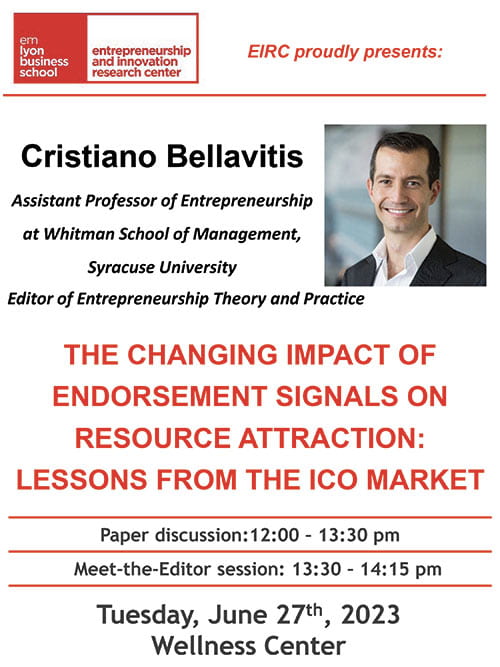EIRC-STORM Seminar – Cristiano Bellavitis on “The changing impact of endorsement signals on resource attraction: Lessons from the ICO market”
Date: Tuesday, June 27th, 2023
On June 27th, 2023, we were honored to welcome Cristiano Bellavitis, who is Assistant Professor of Entrepreneurship at the Whitman School of Management, Syracuse University. He is also Editor of Entrepreneurship Theory and Practice and co-editor of Venture Capital: An International Journal of Entrepreneurial Finance. His research interests focus on entrepreneurial finance (business angels), venture capital, initial coin offerings, and blockchain.
He presented and discussed his working paper titled “The changing impact of endorsement signals on resource attraction: Lessons from the ICO market” (co-authored with Daniel Forbes, from University of Minnesota, and Tom Vanacker, from Ghent University).
The paper discussion was followed by a meet-the-editor session in which Cristiano presented statistics about Entrepreneurship Theory and Practice and details of how it is organized and how it structures the review process.
We thank Cristiano warmly for sharing his research and editorial expertise.
Please find more details below.
“The changing impact of endorsement signals on resource attraction: Lessons from the ICO market”
By Cristiano Bellavitis (Syracuse University), Daniel P. Forbes (University of Minnesota), & Tom Vanacker (Ghent University; University of Exeter)
Abstract
Past research shows that new firms that are endorsed by credible third parties raise funding more easily. However, investors often encounter multiple categories of endorsers, and it can be unclear to them which endorsers are credible. We investigate how investors respond to different categories of endorsers as a market develops over time by examining fundraising in the market for Initial Coin Offerings (ICOs). Drawing on a sociocognitive perspective, we argue that as markets develop and information becomes more available, investors will better assess the credibility of specific categories of endorsers and thereby respond more (less) to endorsers whose endorsements are revealed to be more (less) credible. We shed light on how different categories of endorsers can become more or less influential for fundraising over time.


Recent Comments